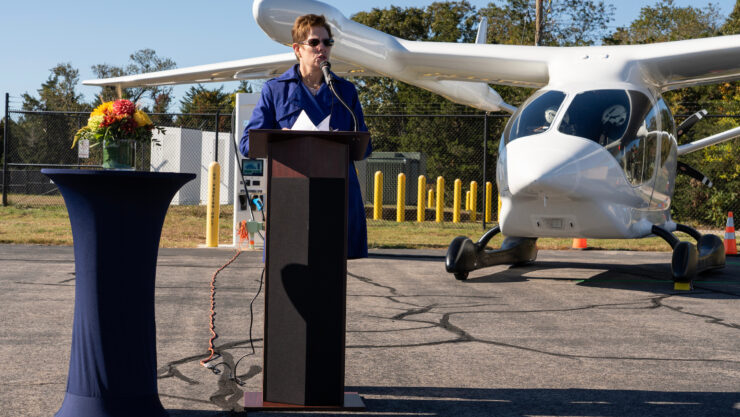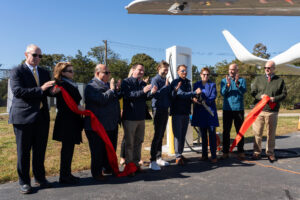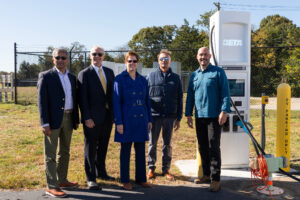FAA regional Admin D’Alessandro discusses air mobility during Massachusetts’ first electric aircraft charging station commissioning – Part 3

Colleen D’Alessandro has a bachelor’s degree in electrical engineering from Worcester Polytech. She earned her master’s in electrical engineering from Northeastern. She was named FAA Regional Administrator overseeing the New England region in 2019.
D’Alessandro worked her way up in the FAA after joining the agency in 2006. And that followed 18 years in engineering at General Electric.
All of which is simply to say, when Colleen D’Alessandro speaks, people listen.
So, when she said that attending Shoreline Aviation’s first-in-the-state electric aircraft charging station commissioning event at Marshfield Municipal Airport on Oct. 13 “is super exciting for me,” perhaps one should take notice.
For one thing, Administrator D’Alessandro is all about advanced air mobility.
“Advanced air mobility is real – you can see that here,” she said to the audience of about 75 attendees, pointing behind her to the ALIA 250 electric aircraft. The ALIA 250 is one of BETA Technologies’ developmental all-electric aircraft, expected to receive FAA certification next year.
“We’re working with our sister federal agencies, across 21 federal agencies, including the Department of Transportation, the Department of Labor, the Department of Commerce and others, to identify the gaps that exist in federal government in order to be able to support this new industry.”
What is advanced air mobility?
According to the FAA, “Advanced Air Mobility (AAM) is a rapidly-emerging, new sector of the aerospace industry which aims to safely and efficiently integrate highly automated aircraft into the NAS (National Airspace System). AAM is not a single technology, but rather a collection of new and emerging technologies being applied to the aviation transportation system, particularly in new aircraft types. Notional AAM use-cases include Urban Air Mobility (UAM), Regional Air Mobility (RAM), public services, large cargo delivery, and private or recreational vehicles.”
And why is it important?
Aviation, BETA says, currently contributes 3-9% of greenhouse gas emissions. And those numbers are growing.
“If we don’t do something about it, by the mid-2030s, aviation will account for half of greenhouse gasses,” BETA COO Blain Newton said at the event. “From our perspective at BETA, we can’t allow that to happen.”

Cutting the ceremonial ribbon are, from left, MassDOT Aeronautics Administrator Jeff DeCarlo, Rep. Josh Cutler aide Susan Moran, Marshfield Town Administrator Michael Maresco, state Senator Patrick O’Connor, Plymouth Area Chamber of Commerce Executive Director Amy Naples, Geoff Douglass (who spearheaded the project for Shoreline), Shoreline Aviation President Keith Douglass, FAA Regional Administrator Colleen D’Alessandro, BETA Technologies COO Blain Newton, South Shore Chamber of Commerce Director of Local Affairs Eric Dykeman. Photo courtesy of BETA Technologies
Stepping up with the fix
Thus the reason for BETA’s existence, forming in 2017 and now on a mission to install its electric aircraft charging stations throughout the country in support of further development of electric aircraft. BETA installed its fast Level 3 aircraft charging station at Marshfield Municipal Airport (KGHG), the first and only electric aircraft charging station in Massachusetts. The company also installed a Level 3 and a Level 2 charging station street-side, for public ground transportation charging. Shoreline is the airport’s fixed base operator.
You can read the origin story of BETA and Shoreline Aviation’s collaboration here, and return to follow this series of stories on this weighty project as it continues.
“I’m really proud to be able to be here today to represent FAA and our contribution to bringing this to reality here at Marshfield Airport,” D’Alessandro said. “This is a historic occasion. It’s great to see so many people here attending today. Support for projects like this is really important. … Our oversight of emerging technology advances aviation, advances positive environmental impacts of aviation. But it really can’t be done without public support. … Thank you to those community leaders for participating in this event, because that is so important to have that community support.”
D’Alessandro congratulated BETA for its work with Shoreline installing the charging station. She noted that the FAA has worked with BETA for several years and sees the company as “an industry leader with a global presence.” She also recognized “former FAAers on the BETA team.” “I know that the agency supports all of the industry leaders and all of the stakeholders in their efforts to improve safety and efficiency, which align with the FAA mission.”

Eversource VP of Energy Efficiency and Electric Mobility Tilak Subrahmanian, left, MassDOT Aeronautics Administrator Jeff DeCarlo, FAA Regional Administrator Colleen D’Alessandro, Shoreline Aviation President Keith Douglass, and BETA Technologies COO Blain Newton pose with BETA’s Level 3 fast charger at Marshfield Municipal Airport. Photo courtesy of BETA Technologies
Into the future
New technology needs new energy, new engagement and participation, and where best to find it is in the schools.
“The FAA and particularly the New England region is focused on reaching out to the public schools and inspiring our youth to consider careers in STEM (science, technology, engineering and mathematics),” she said. “We have a whole cadre of outreach representatives, and those folks get out to schools and plant seeds in those future professionals to get involved with technology and innovation. I would love to see those youth grow into future leaders in technology like this.”
But that’s the future. And this is now. And now – judging by the nonstop swirl of positive energy last week at Marshfield Municipal Airport – is a happening place.
“At the regional level, I’m continually impressed by the strides that we make, particularly in Massachusetts,” D’Alessandro said. “We work very closely with the Airport Managers Association, the MassDOT Aeronautics Division and (Administrator) Jeff DeCarlo, the Massport authority and many other aviation stakeholders in Massachusetts. We have strong relationships with some of the most recognized academic institutions right here in Massachusetts. And we work with all the resources as an agency to support whatever aspirations BETA and airports like Marshfield have in their future growth. So, we’ll be here to work with you.”
Photos and video are courtesy of BETA Technology.
Come back for more parts to this ongoing series, featuring the insights of stakeholders and proponents of combatting global warming through technological development in aviation.
Back to News